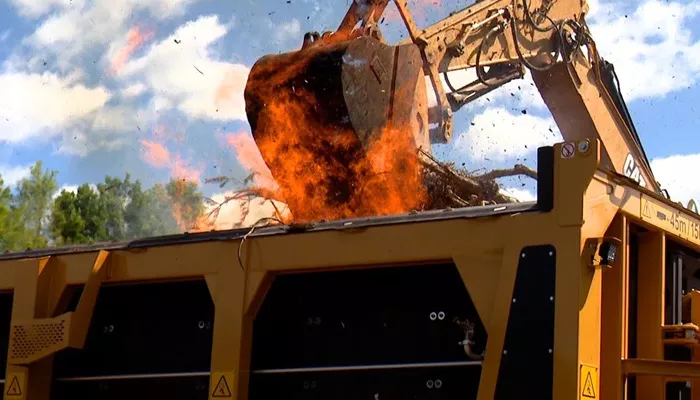In the aftermath of the Canton paper mill’s closure and the destruction caused by Tropical Storm Fred and Hurricane Helene, Haywood County was left with large amounts of wood debris.
“How do we get rid of all this debris?” asked Bill Yarborough, Chair of the Haywood Soil & Water Conservation District. “Can we use this wood for something else?”
To find answers, Yarborough partnered with community groups and secured funding for a solution.
A new machine, manufactured by Tigercat, is helping address this problem. The machine is capable of turning any biomass—such as slabs, logs, and other wood waste—into biochar by burning it at high temperatures.
Yarborough expressed his appreciation for the technology, calling it a “godsend.” He noted that the machine is still relatively new, with only a handful of units in operation.
The machine operates at 1,200 degrees Fahrenheit, using about three and a half gallons of diesel fuel per hour and ten gallons of water per minute. It can handle up to 20 tons of material, reducing it to approximately 2,000 tons of biochar. This carbon-based fertilizer has the potential to revitalize soil and conserve water for long periods. The biochar produced is now being given to local farmers who lost their land during the hurricane.
“Our farmers lost a significant amount of land to the flood,” Yarborough said. “Biochar can help restore the soil. It solves two problems: we get rid of the debris and create a product that benefits farmers.”
Additionally, the biochar process could help reduce the amount of waste going to landfills. “This machine could cut landfill volumes by 90%,” Yarborough explained. “We simply can’t afford to bury all this debris.”
The machine also helps clear forest debris, which could reduce the risk of wildfires in the region. “We don’t need more kindling in our woods,” said Haywood County Manager Bryant Morehead. “The storm has made wildfire prevention a top priority.”
Morehead, along with other local officials, attended a demonstration of the machine to learn more about its potential.
While the machine’s benefits are clear, questions remain about the byproduct and its long-term use. “It’s a great solution on the surface,” Morehead said. “But we need to figure out what to do with the byproduct. We are still researching how to make the most of it.”
The machine is not cheap. A single unit costs nearly $1 million, and that’s before accounting for labor and operational costs. To keep the project going, continued funding is necessary from various sources.
“We currently don’t have a dedicated revenue stream for this project,” Morehead added. “We’ll need partnerships between Haywood County, state and federal agencies, and local organizations to make it work.”
John Fletcher, the contractor overseeing the machine, stressed the importance of moving biochar into the mainstream. “It’s time for biochar to be recognized as a valuable tool for both disaster recovery and sustainable farming.”
Yarborough echoed that sentiment, saying, “We need to get this debris processed and out of the way. This machine could be the future. If we had more of these in each county, it could help several counties at once.”
However, the lease for the current machine ends in a month, and the cost of running it is close to $100,000 per month. Without additional funding, its future remains uncertain.

